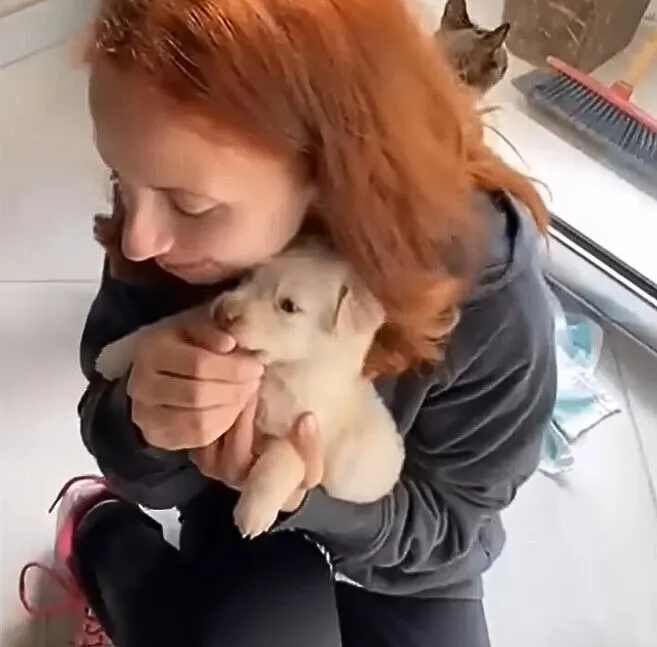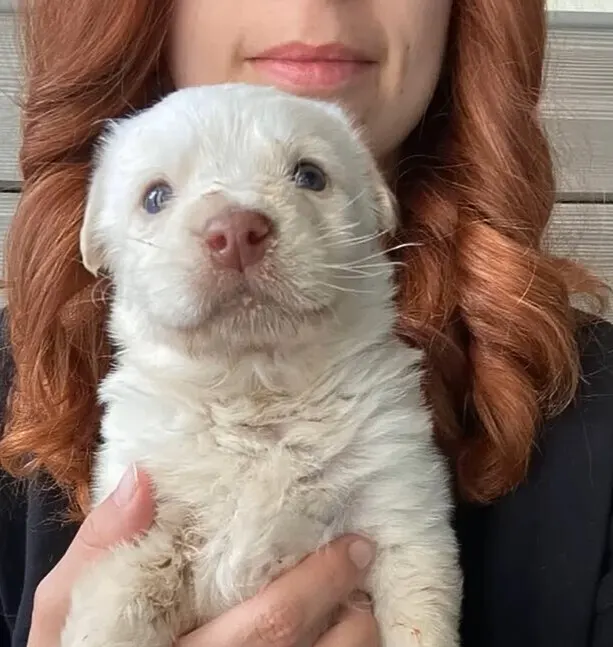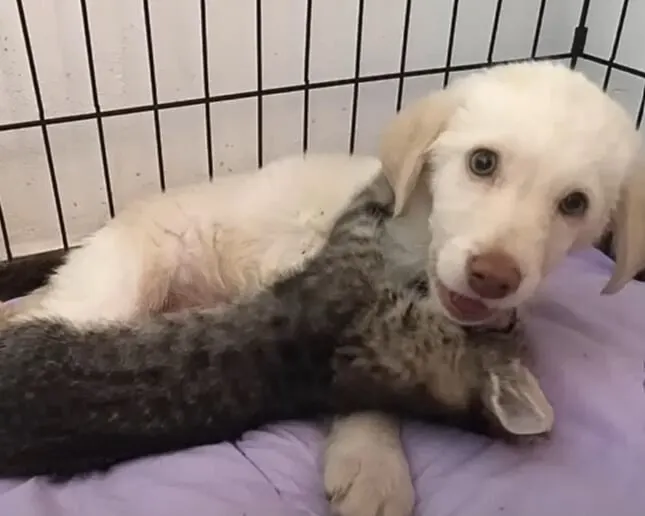It’s utterly heartbreaking to imagine that any person could be so cruel as to abandon a helpless little puppy and throw her out of a car. And yet, this is exactly what happened to a seven-day-old puppy named Hola.
Instead of being adored and pampered with care, she was separated from her mom and betrayed by her ruthless owners.
While Hola was helplessly lying in the middle of the road with her eyes closed, she was unaware of the danger she was in.
Hola’s Guardian Angel

Francesca, a giant-hearted woman, happened to see when a heartless person threw the puppy from a moving car. She immediately ran towards her, picked her up, and rushed her to the vet.
After the puppy was given a complete medical checkup, the vet informed Francesca that Hola would need a miracle in order to survive. The little puppy had seizures and she was fighting to survive.
Francesca was resolved to do whatever it took to help Hola win the most important battle of her life. She could never give up on her.
The vet prescribed Hola the necessary medication, and Francesca took her home. Hola became her number one priority. She was determined to nurse her back to health.

She bottle-fed her and gave her round-the-clock care. Hola faced many ups and downs during her recovery and Francesca was always by her side.
Thanks to her unconditional love and amazing care, Hola pulled through and her health began improving.
Although she still has seizures, they are less frequent, and Hola can play and enjoy life like all other puppies.

Francesca rejoiced at seeing Hola gain weight. She became a strong puppy who is curious to explore her surroundings. She spent her days playing with Francesca’s other dog and a cat.
Hola enjoys the warmth of Francesca’s home and she feels loved.
Finding The Unconditional Love And Happiness

After Hola made a complete recovery, Francesca knew that it was time to find her a forever home. Although she loved the delightful pup very much, she knew that she couldn’t keep her.
Francesca posted an advertisement for adoption. She wanted to find the right person for Hola and to make sure she would have a wonderful forever home.
As soon as a kind woman saw the ad and Hola’s photo, she fell head over heels in love with her. She had been looking for a dog for some time, and once she saw Hola, she knew that the search was over.

The woman gave Hola the perfect forever home and showered her with love. Hola’s mom helped her continue flourishing into a happy dog.
Although Francesca knew she would miss the wonderful pup, she was over the moon because Hola found a great home. She was glad that she was there for Hola when she needed her the most.
Hola loves her new mom deeply and her sweet cuddles make her feel safe and adored.
The lovely pup found the happiness and unconditional love that all animals deserve. Thanks to Francesca, Hola will never know that she was abandoned. She will only remember the happy days.
Ever noticed your furry friend shivering, even on a mild day? It’s a common sight that can leave you wondering what’s going on in your pup’s world. Dogs, like humans, have their ways of communicating feelings and needs. When your canine companion starts to shiver, it’s like a subtle language they speak. Understanding why dogs shiver goes beyond just the physical aspect; it’s a glimpse into their emotional world.
As a seasoned dog trainer, you’ve probably encountered this behavior countless times. Each shiver tells a unique story, a tale of excitement, anxiety, or even a simple chill. It’s a reminder that our four-legged pals have their own way of expressing themselves. So, the next time you see your dog shiver, remember, there’s more to it than just a quiver; it’s a window into their world that they’re inviting you to peek through.
Understanding Shivering in Dogs
The Basic Mechanics of Shivering
When a dog shivers, it’s their body’s way of generating heat to maintain their core temperature. Just like humans, dogs shiver when they’re cold to warm up. Shivering is a natural response to cold temperatures and is a mechanism that helps dogs regulate their body heat.
Differentiating Between Normal and Abnormal Shivering
Normal shivering in dogs is often related to environmental factors such as cold weather and is usually temporary. However, abnormal shivering may indicate an underlying health issue. If your dog is shivering excessively without any apparent cause, it’s essential to consult a veterinarian to rule out any medical concerns. Pay attention to other accompanying symptoms that could signal a more serious problem.
Common Reasons Why Dogs Shiver
Feeling Chilly
Dogs shiver when they feel cold, just like humans. If your furry friend is shivering and the weather is chilly, it’s likely their way of trying to stay warm. Dogs may shiver in response to low temperatures to help maintain their body heat. Providing them with a cozy blanket or a warm spot to snuggle up can help them feel more comfortable and reduce their shivering.
Excitement or Anticipation
Excitement and anticipation can also cause dogs to shiver. When your dog is excited to see you, go for a walk, or play with their favorite toy, they may exhibit signs of shivering. This type of shivering is usually short-lived and accompanied by other joyful behaviors like wagging tails and bouncy movements. It’s a natural response to heightened emotions and shouldn’t be a cause for concern.
Seeking Attention
Sometimes, dogs shiver as a way of seeking attention. If your pup feels ignored or wants affection, they may shiver to grab your focus. This behavior is a form of communication to let you know they need some love and petting. Giving them attention and spending quality time together can help alleviate this type of shivering, making your dog feel secure and content.
Remember, understanding why your dog is shivering can help you provide the appropriate care and attention they need. By recognizing these common reasons for your dog’s shivering, you can ensure they stay happy and healthy. If you notice excessive or persistent shivering without an apparent cause, it’s essential to consult a veterinarian to rule out any underlying health issues.
Medical Causes of Shivering in Dogs
Pain and Discomfort
Dogs may shiver due to pain or discomfort. Just like humans, dogs may tremble when they are experiencing pain resulting from an injury or a health issue. If you notice your furry friend shivering and suspect it’s due to pain, it’s crucial to seek veterinary attention to identify and address the underlying cause promptly.
Neurological Disorders
Neurological disorders can also lead to shivering in dogs. Conditions such as seizures, tremors, or other neurological issues may trigger uncontrollable shaking in your canine companion. If your dog is exhibiting persistent or abnormal shivering alongside other concerning symptoms, consulting a veterinarian for a thorough evaluation is essential to diagnose and manage any potential neurological disorders.
Toxin Exposure
Exposure to toxins can cause dogs to shiver as their body reacts to the harmful substances. Ingesting toxic plants, chemicals, or other harmful substances can result in tremors and shivering in dogs. If you suspect that your dog has come into contact with a toxin and is showing signs of shivering, it’s vital to seek immediate veterinary help to prevent further complications and provide the necessary treatment.
Note: Remember, prompt veterinary care is crucial if your dog is experiencing persistent or abnormal shivering, as it can indicate underlying health issues that require attention.
Behavioral and Emotional Triggers
Fear and Anxiety
When dogs feel scared or anxious, they might shiver involuntarily. Loud noises, such as thunderstorms or fireworks, can trigger fear in dogs, leading to trembling. Situations like visits to the vet or being left alone can also cause anxiety-induced shivering. If your dog is trembling due to fear or anxiety, creating a calm and safe environment can help reassure them.
Stress-Induced Shivering
Stress can manifest in various ways in dogs, including shivering. Changes in routine, new environments, or interactions that cause discomfort or tension can result in stress-induced trembling. Providing a consistent routine, a comfortable living space, and positive reinforcement can help reduce your dog’s stress levels and minimize shivering episodes.
When to Consult a Veterinarian
Identifying Concerning Symptoms
If you notice any of the following signs in your dog, it’s time to consult a veterinarian:
- Persistent Shivering: If your dog is shivering for an extended period, especially when they are not cold or not in an exciting situation, it could be a sign of an underlying health issue.
- Associated Behavioral Changes: Watch out for any unusual behavior accompanying the shivering, such as lethargy, loss of appetite, or restlessness.
- Physical Symptoms: Keep an eye on any physical symptoms like vomiting, diarrhea, coughing, or difficulty breathing that occur along with the shivering.
The Importance of Timely Veterinary Care
Timely veterinary care is crucial when your dog is experiencing abnormal or persistent shivering. Here’s why:
- Early Detection: A veterinarian can conduct a thorough examination to identify the underlying cause of the shivering early on, allowing for prompt treatment.
- Effective Treatment: Getting professional help ensures that your dog receives the appropriate treatment for any health issues causing the shivering.
- Peace of Mind: Consulting a veterinarian promptly can give you peace of mind and help ensure the well-being of your furry companion.
Remember, when it comes to your dog’s health, it’s always better to be safe than sorry. If you’re unsure or concerned about your dog’s shivering, don’t hesitate to reach out to a veterinarian for expert advice and care.
Preventing Unnecessary Shivering
Proper Shelter and Warmth
Ensure your furry friend has a cozy shelter with ample warmth. Providing a comfortable bed and blankets can help regulate their body temperature, reducing the chances of shivering due to cold. If your dog spends time outdoors, consider a dog house or shelter to shield them from harsh weather conditions.
Recognizing Signs of Stress
Watch out for signs of stress in your dog to help prevent unnecessary shivering. Common indicators include trembling, panting, excessive yawning, or avoiding eye contact. By recognizing these cues early on, you can take steps to alleviate stressors in your pet’s environment and create a calm and soothing atmosphere to promote relaxation.
Conclusion
Understanding why dogs shiver goes beyond just the physical act. It’s a way for them to express their emotions and needs, ranging from excitement to anxiety. By recognizing the different triggers and responses, you can create a more comfortable environment for your furry friend. Remember, providing warmth and comfort is key to preventing unnecessary shivering. Keep an eye out for signs of stress and seek professional help if needed. Your dog’s well-being is in your hands, so make sure to show them the love and care they deserve.
Frequently Asked Questions
Why do dogs shiver?
Dogs shiver to communicate emotions like excitement, anxiety, or in response to cold temperatures. Abnormal shivering can also indicate potential health issues.
What triggers shivering in dogs?
Behavioral triggers like fear, anxiety, and stress can lead to involuntary shivering in dogs.
How can I help reduce my dog’s stress-induced shivering?
Creating a calm environment, offering positive reinforcement, and providing proper shelter and warmth are effective strategies to reduce stress-induced shivering in dogs.
When should I seek veterinary care for my dog’s shivering?
Seek veterinary care if your dog’s shivering persists or appears abnormal, as it could indicate underlying health problems that need attention.
[no_toc]

Hey there, I’m Janet Brooks, a dog-loving student from California. I’m all about helping pups in need, especially those without homes. Me and my awesome friends work together to give shelter and love to stray dogs. Oh, and I also write blogs about dogs to share helpful info.